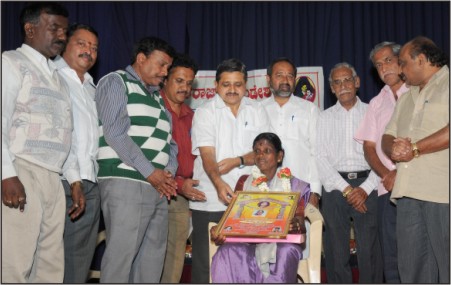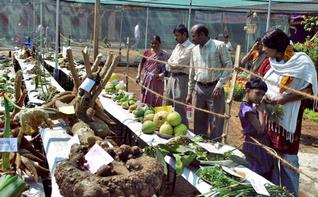An interested visitor at the Honey Festival in Bangalore on Saturday. / Photo: V. Sreenivasa Murthy / The Hindu
If you are looking for the rare unifloral honey, head to Lalbagh Botanical Gardens where the two-day Honey Festival is under way. Unifloral honey in lychee, cajanus, clover, acacia and ajwain are among those that are on display, along with multilforal honey that is commonly available in the market.
Unifloral honey, sourced from different parts of the country and processed here, has a distinct flavour that the multifloral honey lacks. Though expensive (some cost double that of normal honey which costs between Rs. 200 and Rs. 250 a kg), these uniflorals are in demand.
Drawing interest
Not only is the festival one of its kind in the city, it will provide you with a glimpse of honey production and processing. The body suit, face mask, hive tools, box stand and migration kit have been displayed to help the public understand all aspects of apiculture.
Also on offer is a combo of honey with bun, fruits, ice-cream, dry fruits, gulkand and tea. “We have tried out various combinations of honey that is tasty and healthy. Those who have tasted them are giving us good feedback,” said J.D. Shivakumar of Prakruthi, which is planning to open an outlet in Kalyan Nagar here to promote the combo brand.
The festival, at M.H. Marigowda Memorial Hall in Lalbagh, has attracted a number of honey producers, processors, traders, co-operative societies, research institutes and universities. Apart from the direct sales of honey and honey-based products, the festival also has an interactive workshop on promotion of apiculture in the State.
Principal Secretary, Department of Horticulture, M.K. Shankarlinge Gowda, said though there is an annual demand for 8,000 tonnes of honey, the State is able to produce just about 4,000 tonnes. “Karnataka has the potential to produce 10,000 tonnes of honey annually and apiculture needs to be promoted among farmers,” he added.
source: http://www.TheHindu.com / Home> News> National> Karnataka / by Staff Reporter / Bangalore, March 24th, 2013




